737-215-3211

How to Establish a Routine for Your New Puppy
Welcoming a new puppy into your home is an exciting journey filled with cuddles, playtime, and unforgettable moments. However, puppy parents quickly learned that establishing a daily schedule and routine is crucial for the well-being of themselves and their new puppies.
A well-structured puppy schedule not only helps manage the adorable chaos that comes with new puppies or adopting adult dogs but also plays a vital role in their development and adjustment to their new environment. From feeding schedules to potty training, and from playtime to bedtime, creating a consistent routine is the key to a happy, healthy, and well-behaved puppy.
Let's start puppy training and creating a puppy's daily schedule throughout the day! We'll help you create a sample puppy schedule based on your pup's age, preferences, and needs.
Understanding Your Puppy's Needs
Bringing a new puppy into your home is a delightful and transformative experience. These little dogs bring with them an abundance of love, laughter, and a fair share of challenges.
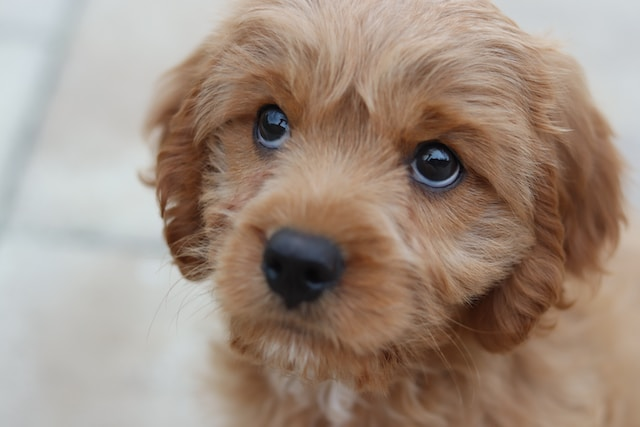
As a pet owner, one of the first and most crucial steps you can take is understanding your puppy's needs. It forms the foundation of establishing an effective routine — a key factor in nurturing a healthy, well-adjusted pet, and in creating a harmonious living environment for both you and your new furry family member.
Benefits of Establishing Puppy Schedule & Routine
Establishing a schedule and routine for a new pup is crucial for several reasons, both for the puppy's well-being and the owner's ease of managing their pet. Here are some key points highlighting the importance of this practice:
-
Promotes Behavioral Training and Discipline: It helps teach a pup discipline and good behavior. When a puppy knows what to expect at certain times of the day, such as meal times, walks, and bathroom breaks, it reduces their separation anxiety and uncertainty, leading to fewer behavioral problems.
-
Aids in House Training: Regularly scheduled potty breaks are essential for house training. A new or old puppy that learns to relieve itself at specific times is less likely to have accidents inside the house.
-
Ensures Proper Growth and Health: A routine ensures they receive the right amount of food, physical exercise, and alone time at regular intervals, promoting healthy growth.
-
Helps in Socialization: Regularly scheduled playtimes and walks are opportunities for socialization, which is vital for a puppy's development. This exposure to different people, family members, animals, and environments helps them become well-adjusted and less fearful adults.
-
Creates a Sense of Security: Like young children, puppies feel more secure when their day is predictable. It also helps your puppy settle down in their new puppy home.
-
Improves Sleep Patterns: Consistent sleep and nap time schedules help regulate a puppy’s internal clock, ensuring they get enough rest.
-
Eases Owner’s Management: For pet owners, a set routine simplifies the management of their new pup. It helps in organizing the day around the puppy's day and needs while balancing other responsibilities, and reducing stress for the owner. Puppy schedule can also be based on your own schedule.
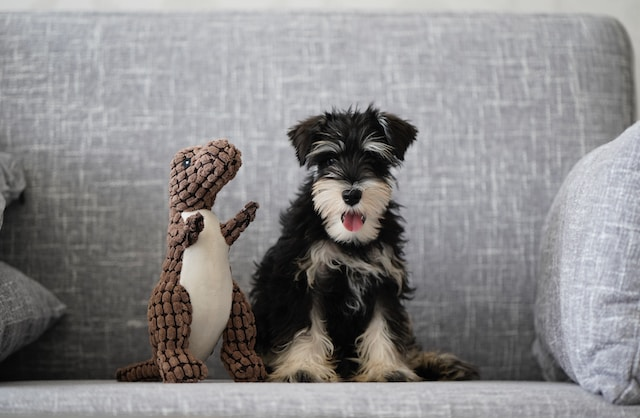
-
Strengthens Owner-Puppy Bond: A routine establishes regular interaction and training sessions between the owner and the puppy, which strengthens their bond. It builds trust and a deep, mutual understanding, enriching the relationship.
-
Prepares for Vet Visits and Grooming: A regular routine that includes grooming and vet check-ups acquaint the puppy with being handled and examined, making these experiences less stressful for both the puppy and the owner.
-
Facilitates Monitoring Health and Behavior Changes: When a puppy follows a consistent routine, it's easier for pet owners to notice any changes in behavior or health, which can be early indicators of health issues.
How to Establish a Puppy Schedule And Routine
Establishing a routine for a new puppy is essential for their development and your ease of living with them. A good routine sets the foundation for a well-behaved, happy, and healthy dog. Here’s a step-by-step guide to get you started:
1. Create a Feeding Schedule
Proper nutrition is vital for your puppy's growth and health. Establishing a feeding puppy schedule is not only about when to feed your puppy but also what to feed them. Here's how you can set up an effective feeding schedule:
Feeding Frequency Based on the Puppy's Age
-
Under 8 Weeks Old Puppy: For the first few weeks of puppies, they should still be with their mother, as they need to nurse frequently. If you're raising an orphaned puppy, they'll need bottle feeding with a suitable puppy milk replacer every 2-3 hours.
-
8 to 12 Weeks Old Puppy: At this stage, puppies are weaned and should eat high-quality puppy food three to four times a day.
-
3 to 6 Months Old Puppy: Reduce feeding to three times a day. Keep an eye on their growth and adjust portions as needed.
-
6 Months to 1-Year-Old Puppy: For most puppies, feeding twice a day is sufficient. Larger breeds may benefit from continuing the three meals per day schedule a bit longer.
Creating a Consistent Feeding Routine
-
Fixed Meal Times: Feed your pup at the same times every day. Consistency helps regulate their digestion and establishes a regular potty break routine.
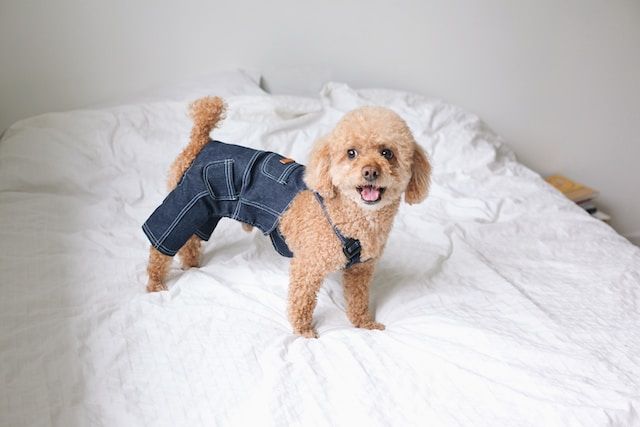
-
Controlled Portions: Follow the portion guidelines on the puppy food packaging or the advice of your veterinarian. Overfeeding can lead to obesity and health problems.
-
Meal Duration: Allow your pup about 20 minutes to eat, then remove any uneaten food. This practice discourages picky eating habits.
Choosing the Right Food
-
Age-Appropriate Food: Select a food specifically formulated for puppies. Puppy food is enriched with the nutrients necessary for growth and development.
-
Breed-Specific Needs: Consider breed-specific formulas, especially for large or small breed puppies, as they have different nutritional requirements.
-
Quality Ingredients: Look for food with high-quality ingredients. The first ingredient should ideally be a source of protein, like chicken, beef, or fish.
-
Consult Your Vet: Your vet can provide recommendations based on your puppy's specific health needs, breed, and growth rate.
2. Establish a Sleep Schedule
Sleep is a crucial component in a puppy's life, playing a vital role in their growth, development, and overall well-being. Puppies require a significant amount of sleep, and setting up a sleep schedule can help them adjust to their new environment while ensuring they get the rest they need.
Understanding a Puppy's Sleep Needs
-
Puppies Need Ample Sleep: Typically, puppies sleep for about 18-20 hours a day. This sleep is essential for their developing brain, muscles, and immune system.
-
Sleep Patterns Change with Age: As your puppy grows, their sleep patterns will change. They'll gradually have less nap time during the day and more during the night.
-
Different Breeds, Different Needs: Some breeds may require more or less sleep. Larger breeds tend to sleep more than smaller breeds.

Strategies for Helping Your Puppy Sleep Through the Night
-
Establish a Bedtime Routine: Create a calming routine before bedtime, like a gentle play session, followed by a bathroom break. This helps your puppy to fall asleep.
-
Last Bathroom Break: Take your puppy out for a potty break right before bedtime to prevent nighttime accidents and ensure a more restful sleep.
-
Create a Comfortable Sleep Environment: Ensure their sleeping area is cozy, quiet, and safe.
-
Limit Evening Excitement: Avoid overly stimulating activities in the evening. This helps your pup calm down and get ready for sleep.
-
Crate Training: If using a crate, like Zinger Deluxe Aluminum Cage, make it a positive, comfortable space. This can provide a sense of security and a specific place where they know it’s time to sleep.
Related: Tips for Crate Training Your New Puppy
3. Set Up a Bathroom Break
Setting up a bathroom routine and potty breaks for a new puppy is essential for successful house training. Start by choosing a specific outdoor area for your puppy to use as their bathroom. This consistency helps the puppy associate that spot with going to the toilet. Here's a simple routine to follow:
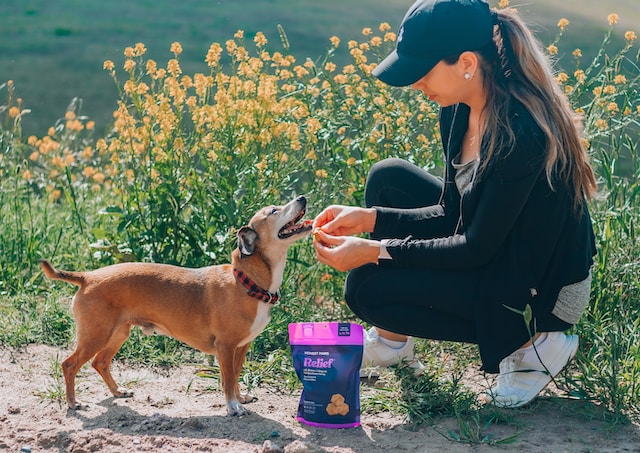
-
Frequent Trips: Young puppies have small bladders and need to go out frequently. Take them out every 1-2 hours, including first thing in the morning, last thing at night, and shortly after meals, naps, and play sessions.
-
Use a Cue: When you're at the chosen spot, use a consistent word or phrase like “go potty.” This will help your puppy understand what’s expected.
-
Praise and Reward: Immediately after your puppy goes to the bathroom, praise them enthusiastically and offer a treat like Omega Fields Smart Hearts Dog Treats. Positive reinforcement makes them more likely to repeat the behavior.
-
Supervision: When indoors, keep an eye on your puppy for signs they need to go (such as sniffing, circling, or squatting) and promptly take them outside.
-
Consistent Feeding Schedule: Feeding your puppy at the same times each day can create a predictable potty break schedule.
-
Accident Management: If accidents happen, clean them up thoroughly without punishment. Avoiding scolding is important as it can create fear or anxiety about going to the bathroom.
Remember, patience and consistency are key. Puppies learn over time, so stick with the routine, and you'll see progress.
4. Plan for Playtime and Exercise
Playtime and exercise are not just fun for puppies; they're essential components of their development and well-being. Understanding the importance of these activities and how to balance them with rest and quiet time is key to raising a happy, healthy puppy.
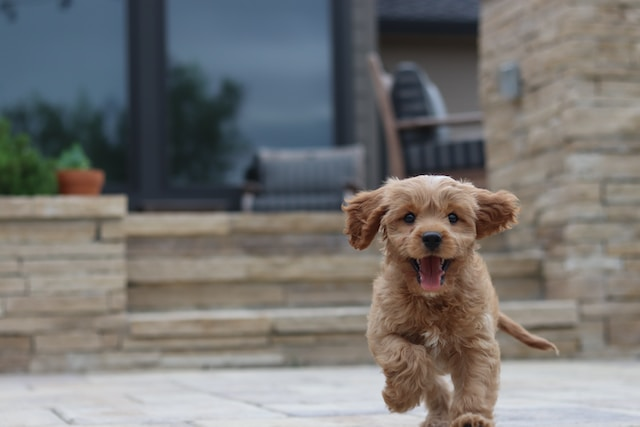
Here's how to create an effective routine:
-
Tailor to Age and Breed: Consider your puppy's breed and age. Smaller breeds and younger puppies tire quickly and may need shorter, more frequent play sessions, while larger breeds often require more exercise.
-
Daily Exercise: Aim for at least 30 minutes to an hour of exercise each day, broken into smaller sessions. This can include walks, gentle running, or playing in a safe, enclosed area.
-
Interactive Play: Engage in interactive games like fetch, tug-of-war, or hide-and-seek. These activities stimulate your puppy's mind and strengthen your bond.
-
Mental Stimulation: Use a puzzle toy and training games to challenge your puppy mentally. Teaching tricks and commands also count as play help with cognitive development and provide mental stimulation.
-
Safe Socialization: Once your puppy is fully vaccinated, introduce them to other dogs and new environments. Social play is important for behavioral development.
-
Rest Time: Puppies need lots of rest, so balance play and exercise with adequate downtime.
-
Watch for Overexertion: Puppies can be energetic but know their limits. If they seem tired or disinterested, it's time to take a break.
Ideas for Safe and Engaging Play Activities
It's important to keep outdoor activities varied and fun to keep your puppy engaged and excited. Here are other interesting activities to try:
-
Play Fetch: A classic game that helps with exercise and can be used to practice commands like "come" and "drop it."
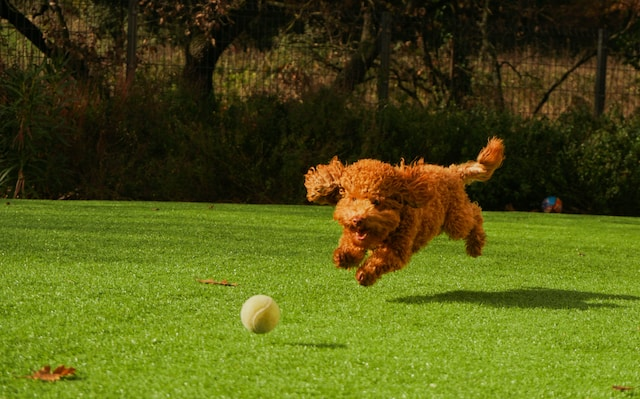
-
Tug-of-War: A good outlet for a puppy's instincts, but always set rules to avoid aggressive behavior.
-
Puzzle Toys: Dog toys that dispense treats as the puppy solves the puzzle are great for mental stimulation. Try ReThink Pet Treat Dispenser Beef Scented.
-
Training Games: Simple training sessions with basic commands can be made fun and engaging. Give Cadet Triple Chew Treats Bundle of Four whenever your pup follows your commands.
-
Obstacle Course: Create a simple obstacle course in your yard or living room to provide physical and mental exercise.
5. Add Dog Training Time
Incorporating training into your new puppy's schedule is essential for their development and can be seamlessly integrated into daily routines. Teach them the basic commands to ensure they're safe and healthy. Here's how to do it:
-
Start with Short Sessions: Puppies have short attention spans, so begin with training sessions of 5-10 minutes, several times a day. As your puppy grows and their concentration improves, gradually extend the duration of the sessions.
-
Consistent Times Each Day: Schedule training at consistent times, such as after a meal or playtime when your puppy is more likely to be attentive and less energetic. Morning and evening are typically good times for focused training.
-
Integrate Training into Daily Activities: Use everyday interactions as opportunities for training. For instance, ask your puppy to sit before meals, when putting on their leash, or before playing. This reinforces good behavior throughout the day.
-
Positive Reinforcement: Use treats, praise, and affection to reward your puppy for following commands. This positive reinforcement makes training enjoyable and effective.
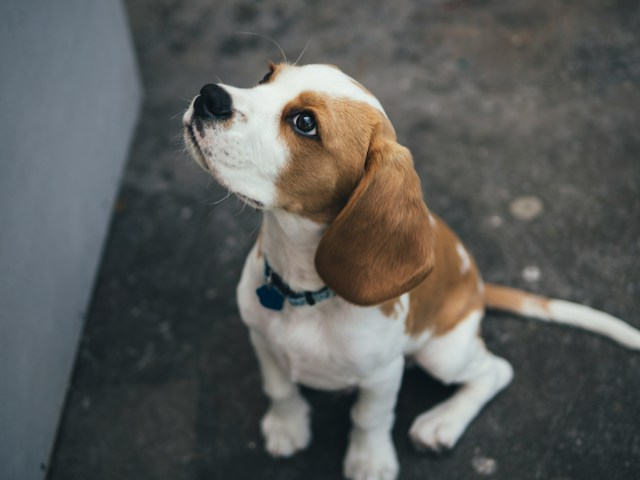
-
Variety in Training: Mix up the skills and commands you work on to keep your puppy engaged and interested. Repetition is important, but so is variety to prevent boredom.
-
Patience and Consistency: Be patient and consistent with commands and expectations. Puppies learn through repetition, so regular training is key to their understanding and obedience.
6. Introduce Quiet Time
Introducing quiet time into your new pup's schedule is essential for their well-being, helping them learn to be calm and comfortable with being alone. Here's a simple guide:
-
Create a Comfortable Space: Set up a cozy area for your puppy, like a dog crate or a quiet corner with a bed, such as Bowsers The Streamline Sterling Lounge Dog Bed, and some toys. This space should be a positive and safe place for them, not used for punishment.
-
Start with Short Durations: Begin with short periods of quiet time, gradually increasing the duration. Start with just a few minutes and slowly work up to longer periods. This helps your puppy adjust without feeling abandoned or anxious.
-
Routine Integration: Incorporate quiet time into the daily routine, ideally after a play session or walk when your furry friend is naturally tired and more likely to rest.
-
Encourage Independent Play: Provide toys or chew items that can keep them occupied and content during quiet time.
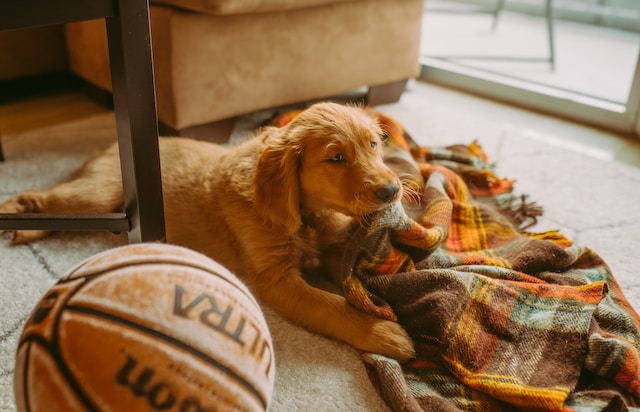
-
Stay Calm During Separation: When it’s time for quiet time, calmly place your puppy in their designated area and leave without making a big fuss. This helps them understand that being alone is normal and nothing to be anxious about.
-
Be Consistent: Consistency is key. Try to have quiet time around the same time each day so your puppy knows what to expect.
7. Schedule Regular Vet Visits
Scheduling regular vet visits is a critical part of your new puppy's healthcare routine. Here's how to integrate these appointments effectively into your schedule:
-
First Visit: Schedule your puppy’s first vet visit within a few days of bringing them home. This initial check-up will assess their general health, verify vaccinations, discuss deworming, and set a schedule for future vaccinations.
-
Vaccination Puppy Schedule: Puppies require multiple rounds of vaccinations in their first year. Typically, these are given at 8, 12, and 16 weeks of age, but your vet will provide a specific schedule based on your puppy’s health and vaccination history.
-
Routine Check-ups: After the initial series of vaccinations, regular check-ups are typically annual. These visits include health screenings, dental check-ups, and booster shots as needed.
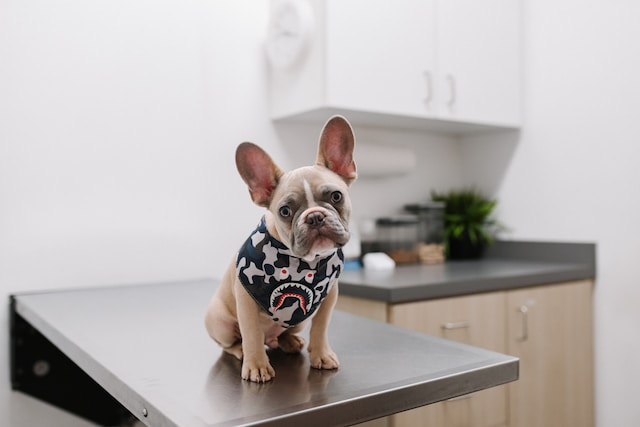
-
Parasite Control: Discuss with your vet a schedule for flea, tick, and heartworm prevention. This is often a monthly treatment.
-
Spaying/Neutering: Plan for your puppy to be spayed or neutered. Your vet can advise the best age for this procedure, usually around 6 months.
-
Record Keeping: Keep a record of your puppy’s vet visits, vaccinations, and any treatments or medications. This helps in keeping track of their health history and upcoming appointments.
Regular vet visits are essential for monitoring your puppy’s growth and health, preventing diseases, and addressing any concerns promptly. Setting reminders or marking them on a calendar can ensure these important appointments are not overlooked.
New Puppy Routine Challenges
Adapting to a new puppy and establishing a routine can be challenging. And as your puppy grows, their needs and behaviors will also grow and change. Here’s how to adapt your routine to your furry friends.
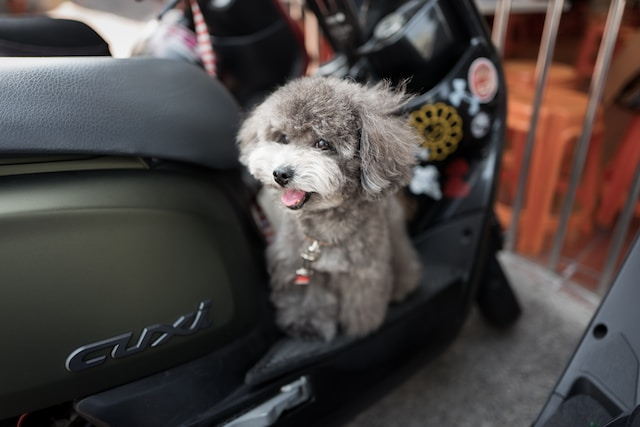
-
Adjust Feeding Schedules: As puppies grow, their dietary needs change. You'll need to transition from multiple small meals a day to fewer, larger meals. Keep monitoring their growth and adjust food portions accordingly.
-
Change Exercise Requirements: Older puppies and adult dogs require more physical exercise than younger puppies. Gradually increase the length and intensity of walks and play sessions.
-
Update Dog Training Sessions: As your puppy matures, their attention span increases. This allows for longer and more complex training sessions. Start introducing advanced commands and continuous obedience training.
-
Adapt Socialization Efforts: Continue to expose your dog to new experiences, but also focus on reinforcing positive behaviors in different environments.
-
Modify Sleep Patterns: Older puppies will sleep less during the day. Adjust their sleep schedule gradually to suit their changing needs.
When to Seek Professional Help
Seeking professional help when creating a puppy schedule can be beneficial in several scenarios:
-
Behavioral Concerns: If you notice persistent behavioral issues like excessive barking, chewing, aggression, or separation anxiety, a professional trainer or behaviorist can offer tailored advice and effective strategies.
-
House Training Difficulties: If house training is not progressing despite your efforts, a professional can help identify the underlying causes and provide specific guidance.
-
Health and Nutrition Questions: For concerns about your puppy's diet, growth, health issues, or vaccination schedules, consulting a veterinarian is crucial. They can provide expert advice on nutritional needs and health care tailored to your puppy's breed and size.
-
Special Needs Puppies: If your puppy has special needs, such as physical disabilities or chronic health conditions, professional guidance can help you create a schedule that accommodates their unique requirements.
-
Busy Lifestyle: If your schedule is hectic and you're struggling to find time for training and care, a professional dog trainer, dog sitter, or pet care advisor can help create a routine that fits your work schedule and lifestyle while meeting your puppy's needs.
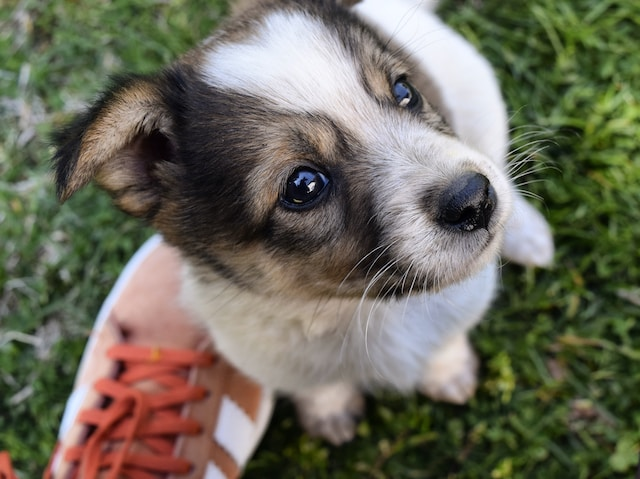
In these cases, professional guidance ensures that your puppy's schedule is not only effective but also promotes a happy, healthy, and well-adjusted life for your new companion.
FAQs
How often should I feed my puppy?
Puppies typically need to be fed three to four times a day. As they grow older, this can be reduced to twice a day. The frequency depends on their age, breed, and dietary needs.
How much sleep does a puppy need?
In general, pups need about 18-20 hours of sleep per day. Ensure they have a quiet, comfortable sleeping area and establish a bedtime routine to help them settle down for the night.
How much exercise does my pup need?
It varies depending on your puppy's age, breed, and health. Generally, puppies require about 5 minutes of exercise per month of age, up to twice a day. For example, a 4-month-old puppy might need 20 minutes of exercise, twice a day. It's important to focus on gentle play and avoid overly strenuous activities to protect their developing joints. Always watch for signs of tiredness and adjust the exercise accordingly.
What if my puppy resists the new routine?
Just be patient and consistent. Puppies often need time to adjust to changes. Keep the routine as regular as possible and use positive reinforcement, like treats and praise, to encourage desired behaviors. If resistance persists, consider if the routine needs adjusting to better suit your puppy’s needs or temperament.
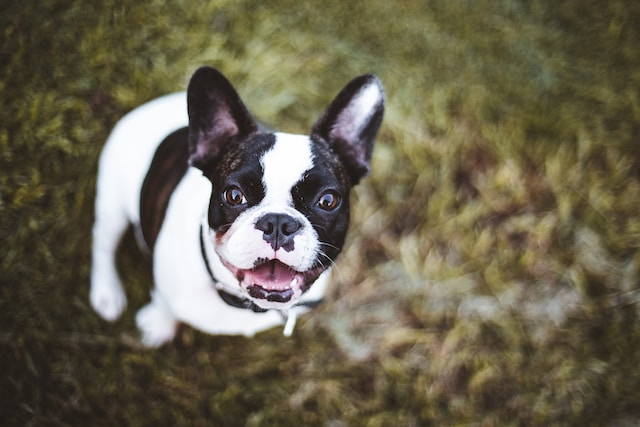
Make Puppy Routine More Fun With Puppy Fever Pro Dog Products
Having a new puppy is exciting and fun. However, it comes with a lot of responsibilities. As a pet owner, you must make sure to give all the dog essentials and needs, including creating your puppy's daily schedule and incorporating it into yours.
Don't worry, with Puppy Fever Pro getting quality dog products and puppy supplements is easier! We have numerous puppy essentials including a customizable puppy starter kit, a standard kit, and a premium kit.
For more puppy owner tips and tricks, subscribe to our blogs!
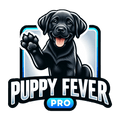

Leave a comment